 Ratatouille (Disney Pixar) | DVD | (11/02/2008)
from £N/A
| Saving you £N/A (N/A%)
| RRP
Ratatouille (Disney Pixar) | DVD | (11/02/2008)
from £N/A
| Saving you £N/A (N/A%)
| RRP The unthinkable combination of a rat and a 5-star gourmet restaurant come together for the ultimate fish-out-of-water tale.
 Young Hearts DVD | DVD | (17/11/2025)
from £N/A
| Saving you £N/A (N/A%)
| RRP
Young Hearts DVD | DVD | (17/11/2025)
from £N/A
| Saving you £N/A (N/A%)
| RRP ![Annabelle: Creation [DVD + Digital Download] [2017]](/pictures/1145738.jpg) Annabelle: Creation | DVD | (04/12/2017)
from £7.55
| Saving you £N/A (N/A%)
| RRP
Annabelle: Creation | DVD | (04/12/2017)
from £7.55
| Saving you £N/A (N/A%)
| RRP In Annabelle: Creation, several years after the tragic death of their little girl, a doll maker and his wife welcome a nun and six girls from a shuttered orphanage into their home. They soon become the target of the doll maker's possessed creation, Annabelle.
![101 Dalmations [DVD]](/pictures/1117335.jpg) 101 Dalmations | DVD | (03/09/2012)
from £8.91
| Saving you £-0.16 (N/A%)
| RRP
101 Dalmations | DVD | (03/09/2012)
from £8.91
| Saving you £-0.16 (N/A%)
| RRP 101 Dalmatians has charmed audiences for generations with its irresistible tailwagging stars, memorable story and wonderful blend of humour and adventure. Cruella De Vil, Disney's most outrageous villain, sets the fur-raising adventure in motion when she dognaps all of the Dalmatian puppies in London - including 15 from Pongo and Perdita's family. Through the power of the Twilight Bark, Pongo leads a heroic cast of animal characters on a dramatic quest to rescue them all in a story the whole family will enjoy again and again. Special Features: 101 Pop-Up Trivia Facts For The Family 101 Pop-Up Trivia Facts For The Fan
![101 Dalmations [Blu-ray]](/pictures/1117336.jpg) 101 Dalmations | Blu Ray | (03/09/2012)
from £11.03
| Saving you £0.22 (2.25%)
| RRP
101 Dalmations | Blu Ray | (03/09/2012)
from £11.03
| Saving you £0.22 (2.25%)
| RRP 101 Dalmatians has charmed audiences for generations with its irresistible tailwagging stars, memorable story and wonderful blend of humour and adventure. Cruella De Vil, Disney's most outrageous villain, sets the fur-raising adventure in motion when she dognaps all of the Dalmatian puppies in London - including 15 from Pongo and Perdita's family. Through the power of the Twilight Bark, Pongo leads a heroic cast of animal characters on a dramatic quest to rescue them all in a story the whole family will enjoy again and again. Special Features: Music Video Music and More: Abandoned Songs Deleted Songs Demo Recordings and Alternate Versions Backstage Disney: Redefining the Line Cruella Devil Sincerely Yours Trailers TV Spots Promo Radio Spots
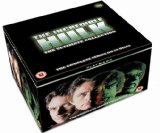 The Incredible Hulk - Series 1-5 - Complete | DVD | (29/09/2008)
from £33.65
| Saving you £-4.76 (N/A%)
| RRP
The Incredible Hulk - Series 1-5 - Complete | DVD | (29/09/2008)
from £33.65
| Saving you £-4.76 (N/A%)
| RRP Includes all episodes from Series 1-5! Dr. David Banner is a research scientist trying to find a way to tap into the hidden strength that all humans possess. Then one night in his labratory an experiment went wrong causing him to be overexposed to gamma radiation. Now whenever angered or distressed the mild-mannered scientist finds himself transforming into a powerful seven-foot green creature known as The Incredible Hulk...
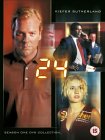 24: Series 1 | DVD | (14/10/2002)
from £14.59
| Saving you £35.40 (242.63%)
| RRP
24: Series 1 | DVD | (14/10/2002)
from £14.59
| Saving you £35.40 (242.63%)
| RRP Such a simple idea--yet so fiendishly complex in the execution. 24, as surely everyone knows by now, is a thriller that takes place over 24 hours, midnight to midnight, in 24 one-hour episodes (well, 45-minute episodes if you extract the ad breaks). Everything to take place in real time--on-screen and off-screen time the same--which means no flash-backs, no flash-forwards, no nice handy time-dissolves. Every strand of the plot has to be dovetailed and interlocked to make sure that things happen just when they should, in the right amount of time. Not that easy. Creator Robert Cochran and his team of writers and directors have done a pretty impressive job in putting the jigsaw together and keeping the tension ratcheted up high, as Federal Agent Jack Bauer (Kiefer Sutherland) hares around LA trying to stall an assassination attempt on a black Presidential candidate and rescue his wife and daughter from the clutches of the Balkan baddies. Twists, turns, revelations and cliffhangers are tossed at us with satisfying regularity. Its not perfect: we get some hokey plot devices (instant amnesia, anybody?) and the final twist, once you start thinking back, makes no sense whatsoever. There are altogether too many huggy family moments ("I love you, Dad." "I love you, son"); and as for überbaddie Dennis Hoppers "Serbian" accent Even so, this is undeniably mould-breaking TV. Sutherland, rescuing his career from the doldrums in one heroic leap, fully deserves his Golden Globe. Sets and locations are artfully deployed--we gain a real sense of LAs splayed-out geography--and Sean Callerys score is a powerful, brooding presence. Like Murder One and The Sopranos, 24 is one of those series future TV thrillers will have to measure themselves against. On the DVDs: 24 is released in a six-disc box set. On discs 1- 5 there are no extras, but disc 6 includes the "alternative" ending and a preview of Series 2, presented by an urbane Kiefer Sutherland, that tells us precisely nothing. The transfer, in 16x9 widescreen and 2.0 Dolby Digital sound, does the high production values of the original every justice.--Philip Kemp
 Coupling: Complete Series 3 | DVD | (22/09/2003)
from £4.89
| Saving you £15.10 (308.79%)
| RRP
Coupling: Complete Series 3 | DVD | (22/09/2003)
from £4.89
| Saving you £15.10 (308.79%)
| RRP The third series of Coupling, first aired in 2002, takes fans of the BBC's comedy of sex, manners and modern relationships into new realms of engaging surrealism, leaving those irritating comparisons with Friends trailing in its wake. The men are constantly in pursuit of a basic grasp of the "emotional things" that make women behave the way they do. The women analyse everything to death. But thanks to Steve Moffat's scripts, tighter and quirkier than ever, these characters are living, breathing human beings rather than cynical ciphers for comedy stereotypes. The performances are as strong as you'd expect from an established team, with actors such as Jack Davenport (the ever-perplexed Steve), Ben Miles (unreconstructed chauvinist Patrick), Sally Alexander (dryly intelligent Susan) and Kate Isitt (neurotic Sally) wearing their roles like second skins. But in the surreal stakes, it's Richard Coyle as Jeff, wondering aloud what happens to jelly after women have finished wrestling in it, and Gina Bellman as Jane, musing on the importance of a first snog in identifying what men like to eat, who really raise the laughter levels. All things considered, this is superior comedy for all thirtysomethings--genuine and putative. --Piers Ford
![The Death of Louis VXI [DVD]](/pictures/1161094.jpg) The Death of Louis VXI | DVD | (20/11/2017)
from £8.85
| Saving you £N/A (N/A%)
| RRP
The Death of Louis VXI | DVD | (20/11/2017)
from £8.85
| Saving you £N/A (N/A%)
| RRP August 1715. After going for a walk, Louis XIV feels a pain in his leg. The next day, the king keeps fulfilling his duties and obligations, but his sleep is troubled and he has a serious fever. He barely eats and weakens increasingly. This is the start of the slow agony of the greatest King of France death from gangrene, surrounded by his doctors and closest advisors, speaking in frantic, whispered tones about their options, in an era in which little is known of such illnesses. Albert Serra's new film, The Death of Louis XIV, is an adaptation of the Duc de Saint-Simon's memoirs, starring Jean-Pierre Léaud as the Sun-King. The cult actor, who worked with all major directors from the Nouvelle Vague after being discovered in Truffaut's The 400 Blows, plays the dying king who can barely move from his bed in the Château de Versailles. His relatives and his closest counsellors come in turns at his bedside, but he attends only a few meetings and can barely rule his kingdom. His secret wife Madame de Maintenon, and his doctor Fagon dread his last breath and try to hide it from the public, to preserve the future of France. Shot in rich colour with extraordinary lighting, Jean-Pierre Léaud, in his costume, hair and poses, fully embodies the last few days of the longest serving king of France, who, with his seventy two years in power, changed the face of the monarchy and of France.
![The King Of Comedy [1982]](/pictures/1014640.jpg) The King Of Comedy | DVD | (19/04/2004)
from £8.46
| Saving you £8.79 (122.08%)
| RRP
The King Of Comedy | DVD | (19/04/2004)
from £8.46
| Saving you £8.79 (122.08%)
| RRP The King of Comedy, which flopped at the box office, is actually a gem waiting to be rediscovered. Like A Face in the Crowd (a not-so-distant cousin to this film), Network, and The Truman Show, its target is show business--specifically the burning desire to become famous or be near the famous, no matter what. Robert De Niro plays the emotionally unstable, horrendously untalented Rupert Pupkin, a wannabe Vegas-style comedian. His fantasies are egged-on by Marsha, a talk-show groupie (brilliantly played by Sandra Bernhard) who hatches a devious, sure-to-backfire plan. Jerry Lewis is terrific in the straight role as the Johnny Carson-like talk-show host Jerry Langford. De Niro's performance as the obsessive Pupkin is among his finest (which is saying a lot) and he never tries to make the character likable in any way. Because there's no hero and no-one to root for, and because at times the film insists we get a little too close and personal with Pupkin, some will be put off. Yet it's one of Scorsese's most original and fascinating films, giving viewers much to consider on the subject of celebrity. Its inevitable climax is clever and quietly horrific. --Christopher J Jarmick
 Coupling - Complete Series 1-4 Box Set (Special Collectors Edition) | DVD | (16/08/2004)
from £47.70
| Saving you £2.29 (4.80%)
| RRP
Coupling - Complete Series 1-4 Box Set (Special Collectors Edition) | DVD | (16/08/2004)
from £47.70
| Saving you £2.29 (4.80%)
| RRP Two's Company. Three's a crowd. So what do you do with six? Who do you know who is over thirty sort-of-single and has a satisfying regular sex-life? Anyone? Being single isn't easy. But at least you've got your friends. But what happens when one of your friends falls in love with one of your friends' friends? This funny up-front series about love and lust amongst thirtysomethings centres around Susan and Steve - two lively sexy funny people who get together and start going out. Featuring series 1 to 4 of the hit BBC sitcom!
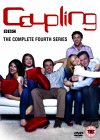 Coupling: Complete Series 4 | DVD | (16/08/2004)
from £8.55
| Saving you £11.44 (133.80%)
| RRP
Coupling: Complete Series 4 | DVD | (16/08/2004)
from £8.55
| Saving you £11.44 (133.80%)
| RRP Coupling Season 4: feel free to insert your own "four-play" joke, or for that matter, your own "insert" joke. Sex is still topic 1 for the intertwined group of "exes and best friends", but in this pivotal season there are momentous "relationship issues" that will upend all their lives (insert your own "upend" joke while you're at it). Susan is pregnant, inspiring in Steve nightmares about his own execution and unflattering comparisons of the birth process to John Hurt's iconic gut-busting scene in Alien. Missing in action is the Kramer-esque Jeff (although he makes something of a return in the season finale). Joining the ensemble is Oliver, who is more in the Chandler mode as a lovable loser with the ladies. These inevitable comparisons to "Sein-Friends" are no doubt heresy to Coupling's most devoted viewers. Indeed, this series does benefit from creator and sole writer Steven Moffat's comic voice and vision. He provides his ever-game cast some witty, funny-cause-it's-true dialogue, as in Oliver's observation that "Tea isn't compatible with porn". This Britcom is also less inhibited in language and sexual situations than its American counterparts. In the cleverly-constructed opening episode, in which the same "9-1/2 Minutes" are witnessed from three different perspectives, Sally and Jane can do what was left to the imagination when Monica and Rachel offered to make out in front of Joey and Chandler. The birth of Susan and Steven's baby ends the six-episode season on a satisfying and surprisingly moving grace note. A bonus disc takes viewers behind the scenes with segments devoted to bloopers and interviews with cast and crew. --Donald Liebenson
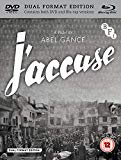 J'accuse (DVD + Blu-ray) | Blu Ray | (24/07/2017)
from £18.98
| Saving you £N/A (N/A%)
| RRP
J'accuse (DVD + Blu-ray) | Blu Ray | (24/07/2017)
from £18.98
| Saving you £N/A (N/A%)
| RRP Acclaimed as one of cinema's finest anti-war movies, Abel Gance's rousing indictment of warfare is as powerful and relevant today as it was on its original release in 1938 Having experienced the horror of the First World War, idealistic poet Jean Diaz (Victor Francen, A Farewell to Arms) turns to technology in a bid to prevent further barbarity. But a meddling and unscrupulous bureaucracy allows Jean's plans to be hijacked as Europe slides towards another great conflict. Using his epic 1919 silent version of the film as a template, Gance pits mankind's romanticism against its capacity for savagery. Originally released on the eve of the Second World War (and the same year as Jean Renoir's La Grande Illusion), J'accuse urges us to honour the memory of the fallen by learning the lessons of a catastrophic past. Special Features: Presented in High Definition and Standard Definition New audio commentary by Paul Cuff Stills and special collections gallery Illustrated booklet with full film credits, reviews and a new essay by Paul Cuff
![Annabelle: Creation [Blu-ray + Digital Download] [2017] [Region Free]](/pictures/1145640.jpg) Annabelle: Creation | Blu Ray | (04/12/2017)
from £4.79
| Saving you £N/A (N/A%)
| RRP
Annabelle: Creation | Blu Ray | (04/12/2017)
from £4.79
| Saving you £N/A (N/A%)
| RRP In Annabelle: Creation, several years after the tragic death of their little girl, a doll maker and his wife welcome a nun and six girls from a shuttered orphanage into their home. They soon become the target of the doll maker's possessed creation, Annabelle.
 The Incredible Hulk - Season 1 | DVD | (28/08/2006)
from £5.15
| Saving you £29.84 (579.42%)
| RRP
The Incredible Hulk - Season 1 | DVD | (28/08/2006)
from £5.15
| Saving you £29.84 (579.42%)
| RRP One of the best television adaptations of a comic book, The Incredible Hulk (1978-82) lent gravity and pathos to the fantastic premise--an experiment gone wrong causes a scientist to transform into a giant creature whenever he becomes angry--established in the popular Marvel Comics series. The network version stripped away the Hulk's outlandish foes (as well as his rudimentary speech) and instead focused on the loneliness of his human alter ego, David Banner (well played by the late Bill Bixby), as he traveled across the United States in search of a cure for his affliction as well as an escape from a prying reporter (the late Jack Colvin, also terrific). But despite its Fugitive-like premise, the TV Hulk never lost its comic book audience thanks to the plausibly ferocious performance by actor/bodybuilder Lou Ferrigno (whose growls were dubbed by actors Ted Cassidy and Charles Napier) as the Hulk, who handled the action portions of the show with plausibly superhuman brawn. The Complete First Season set contains both of the pilots that kicked off the series ("Pilot" was previously released on a separate single disc) as well as all 10 episodes from the first season; among the adventures encountered by David and the Hulk are a gambling scandal in Vegas ("The Hulk Breaks Las Vegas"), a meltdown at a nuclear facility ("Earthquakes Happen"), and a runaway plane ("747," which reunites Bixby with his Courtship of Eddie's Father co-star Brandon Cruz).Extras on the set have been the subject of much Internet debate--the commentary by series writer/producer/director Kenneth Johnson on "Pilot" is the same as on the previous DVD release of this episode (as well as the introduction by Ferrigno), and a proposed gag reel mentioned in promotional material has been moved to a future DVD release. The sole fresh bonus material is "Stop the Presses," an episode taken from the series' second season. --Paul Gaita
![Pumping Iron [Blu-ray]](/pictures/1164061.jpg) Pumping Iron | Blu Ray | (17/03/2023)
from £15.90
| Saving you £N/A (N/A%)
| RRP
Pumping Iron | Blu Ray | (17/03/2023)
from £15.90
| Saving you £N/A (N/A%)
| RRP ![Big Kill [DVD] [2019]](/pictures/1149958.jpg) Big Kill | DVD | (16/09/2019)
from £4.07
| Saving you £N/A (N/A%)
| RRP
Big Kill | DVD | (16/09/2019)
from £4.07
| Saving you £N/A (N/A%)
| RRP A tenderfoot from Philadelphia, two misfit gamblers on the run and a deadly preacher have a date with destiny in a boom town gone bust called Big Kill.
 Abbott And Costello - The Collection | DVD | (28/08/2006)
from £39.99
| Saving you £-19.99 (N/A%)
| RRP
Abbott And Costello - The Collection | DVD | (28/08/2006)
from £39.99
| Saving you £-19.99 (N/A%)
| RRP *Titles to be confirmed
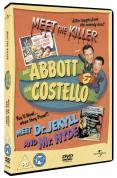 Abbott And Costello - Meet The Killer/Jekyll And Hyde | DVD | (28/08/2006)
from £N/A
| Saving you £N/A (N/A%)
| RRP
Abbott And Costello - Meet The Killer/Jekyll And Hyde | DVD | (28/08/2006)
from £N/A
| Saving you £N/A (N/A%)
| RRP Meet The Killer: Lost Caverns Hotel bellhop Freddie Phillips is suspected of murder. Swami Talpur tries to hypnotize Freddie into confessing but Freddie is too stupid for the plot to work. Inspector Wellman uses Freddie to get the killer (and it isn't the Swami). Jekyll And Hyde: Slim and Tubby are American cops in London to study police tactics. They wind up in jail and are bailed out by Dr. Jekyll. Jekyll has been murdering fellow doctors who laugh at his experiments. He has more murders in mind. At one point the serum that turns Jekyll into the murderous Hyde gets injected into Tubby.
 Coupling: Complete Series 2 | DVD | (23/09/2002)
from £6.15
| Saving you £13.84 (225.04%)
| RRP
Coupling: Complete Series 2 | DVD | (23/09/2002)
from £6.15
| Saving you £13.84 (225.04%)
| RRP Steven Moffat's second series of Coupling, first broadcast in 2001, is a brilliant consolidation of all those neuroses, small deceits, obsessions and personality tics that struck such a resonant chord when Steve, Susan and their four friends were first unleashed on us. Comparisons with Friends itself are tiresome and lazy: Coupling is an intrinsically British comedy that picks apart the trivial and the mundane in everyday relationships and takes them on surreal journeys, leaving the participants hilariously bemused and rarely any wiser. Its success is due to the magical combination of Moffat's very funny scripts and the talents of six extremely likable actors, including Jack Davenport (Steve) and Sarah Alexander (Susan). But it's Richard Coyle's Jeff, whose sexual fantasies and putting-your-his-in-it propensities exert a compelling fascination, who really keeps you watching through your fingers as you hold your hands to your face in disbelief. Breasts, bottoms and pants are the basis for most of the conversational analysis when these friends get together as a group, as couples, as girlfriends or as mates, invariably becoming metaphors for the state of a relationship or situation. Individual viewpoints and terrors are explored through respective memories of the same event and what-if scenarios. Chain reactions inevitably ensue, fuelling comedy that is based almost entirely on misunderstanding. On the DVD: Coupling, Series 2 on disc is presented in 16:9 anamorphic video aspect ratio, together with a crisp Dolby Digital stereo soundtrack; Mari Wilson's sensuous version of "Perhaps, Perhaps, Perhaps" for the theme tune deserves a special mention. Extras include disappointing interviews with writer Steven Moffat and Jack Davenport, which are mainly an excuse to repeat several major scenes from the series in full. The "Behind the scenes" feature is also a let-down: it's just a not very funny record of a cast photo shoot. --Piers Ford

Please wait. Loading...
This site uses cookies.
More details in our privacy policy